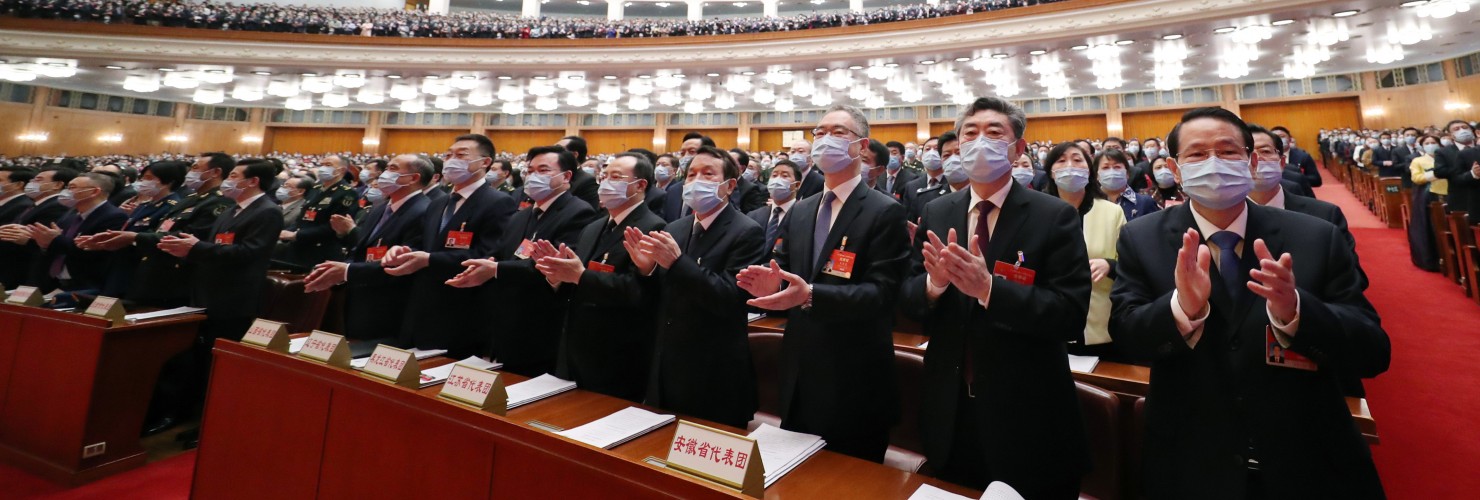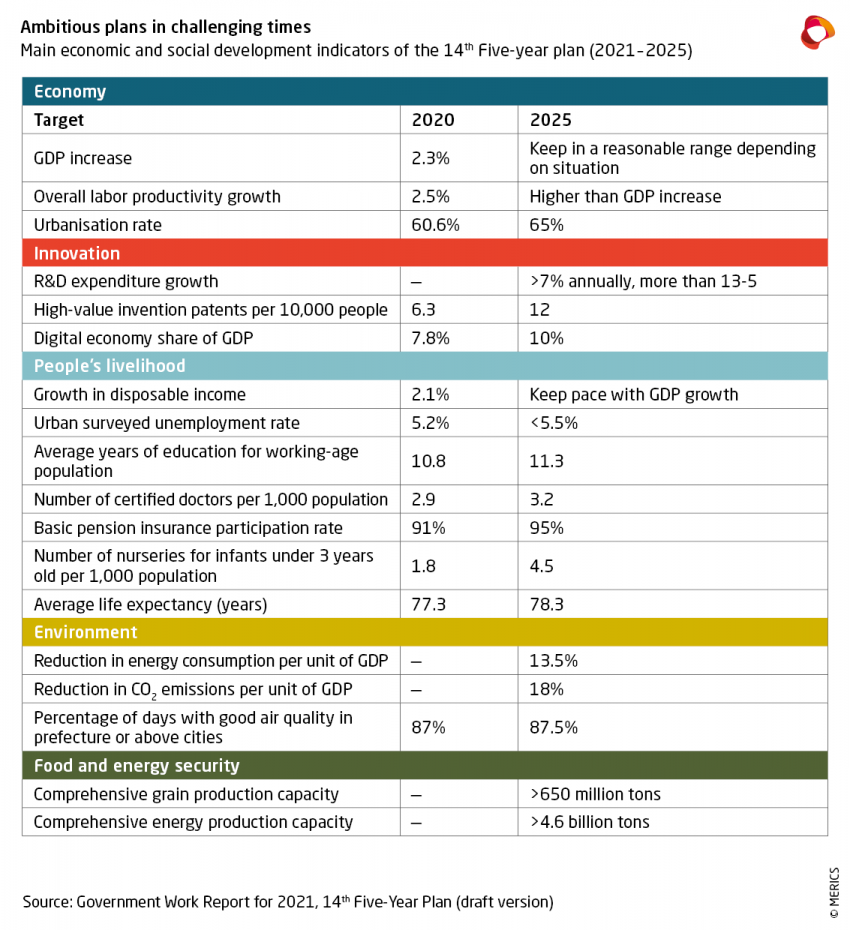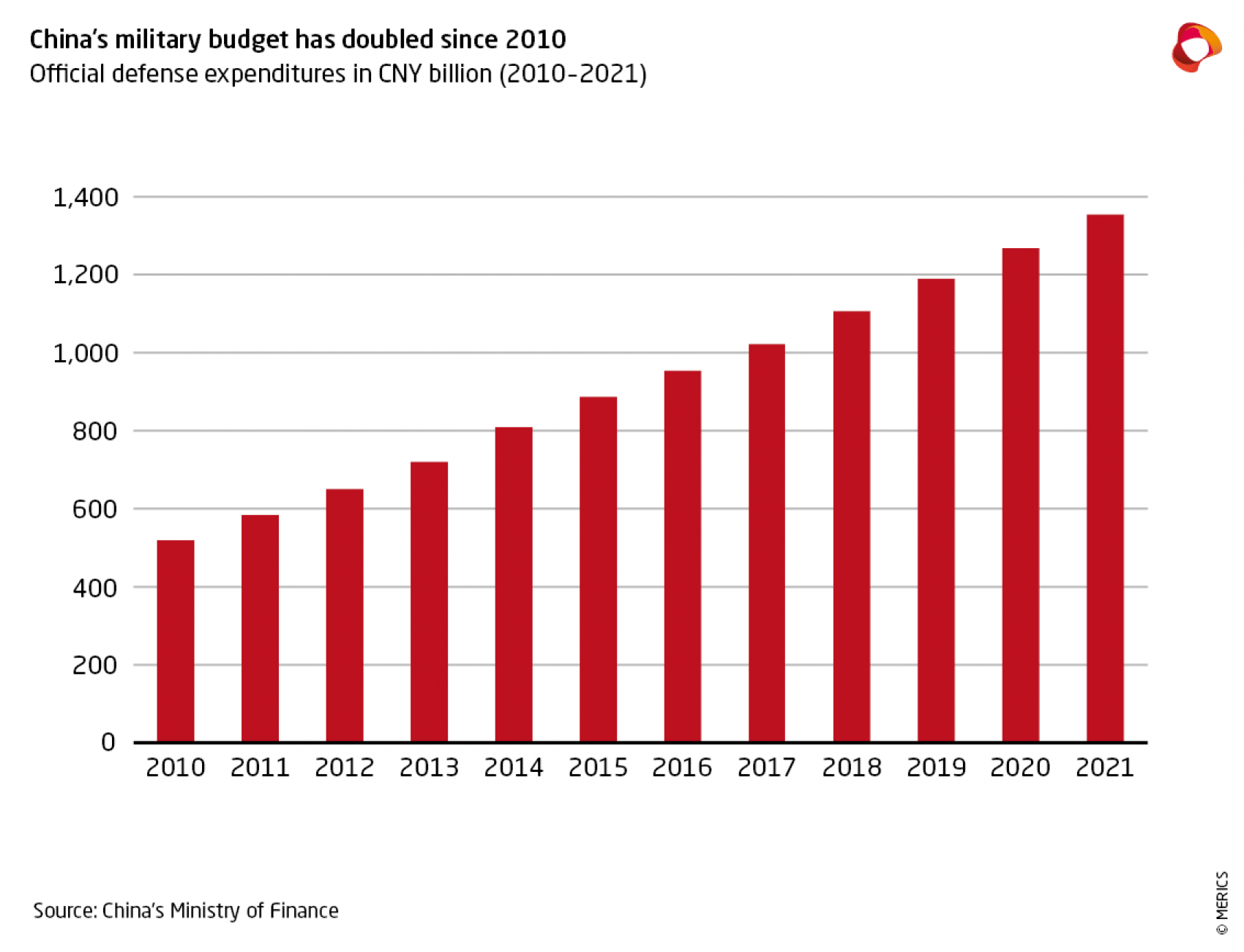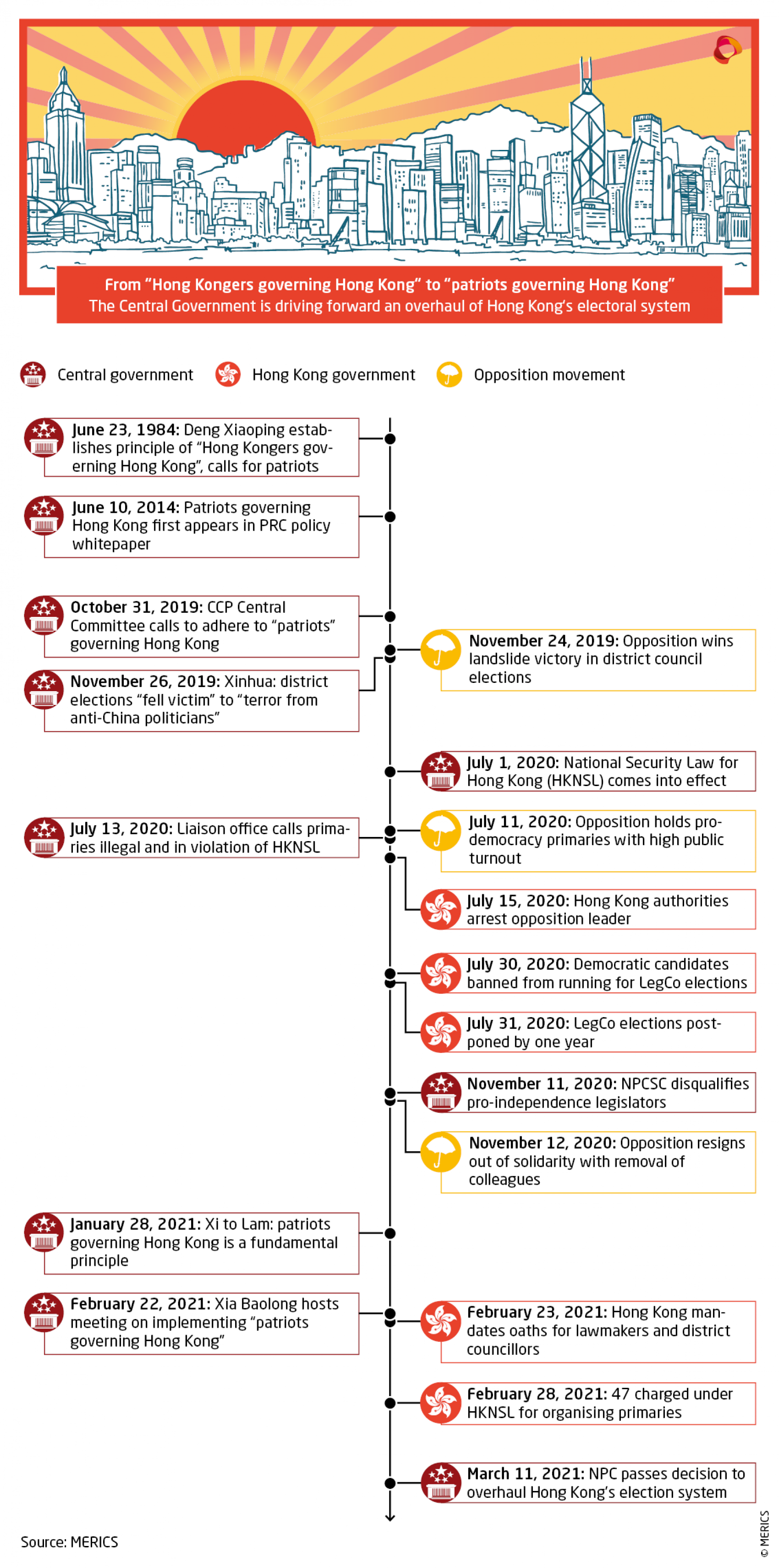

The National People's Congress + China as a global power + Economic reforms
Ambitious plans, ongoing problems: China faces social challenges according to the NPC
As expected, the Chinese leadership has used this year’s National People’s Congress to present itself as self-confident and assertive in face of difficult conditions internationally. To achieve the target of “qualitative growth” and independent technological innovation, China is investing massively in research and development in the coming years. An annual increase of seven percent is planned, as Premier Li Keqiang announced in the government’s work report.
Delegates at the People's Congress also agreed to increase military spending by 6.8 percent. The issue of security remains at the forefront for China's government – not least because of the ongoing tensions with the United States. State and party leader Xi Jinping described the country’s security situation as “unstable and uncertain” at a meeting with senior army representatives. The entire army should cooperate in building up its capabilities and combat readiness, he said.
As expected, the National People’s Congress did not set a clear growth target, but it did name “more than six percent” as the goal. More is now known about the 14th Five-Year Plan. In terms of climate, China showed itself less “green” than observers had hoped. For example, the decision-makers did not set emission limits or name stricter measures to increase the energy efficiency of the economy. If China is to achieve the declared goal of CO2 neutrality by 2060, much bigger concrete steps will be needed. The fact that energy security has been given higher priority will also be an obstacle to a rapid energy transition.
In its inward orientation, the Five-Year Plan reflects the fact that China's leadership is very much aware of the major challenges. Even after the officially successful end of the campaign to reduce poverty, rising inequality remains an urgent problem. Beijing faces the huge task of stabilizing the social security system and supporting rural regions.
With the new Five-Year Plan, China intends to redirect investment to smaller cities and rural areas to narrow the gap between wealthy and poor regions and to make poverty reduction sustainable. In view of the intense discussions within China on food security, modernizing agriculture is also an urgent task.
To support the domestic base, China's leadership faces a difficult balancing act – on the one hand, converting industry from quantitative to high-quality production, on the other hand, ensuring basic needs are met in poorer regions. The investment needed is likely to be difficult, even for a country like China with its high foreign exchange reserves.
After the successful fight against the Covid-19 pandemic, Beijing is formulating a worrying approach to dealing with “contradictions” in society in its Five-Year Plan. Further investment in the security apparatus is just as much a part of this as the merging of security agencies and public bodies, the expansion of digital surveillance, and political campaigns to mobilize the masses. In difficult domestic and foreign policy times, control remains the order of the day for Xi's leadership.
China’s main targets for 2021 in numbers:
- GDP growth: >6.0%
- Military spending 6.8% (up from 6.6)
- Deficit growth 3.2% (down from 3.6%)
- Creation of new urban jobs: >11 million (up from 9)
- Unemployment: around 5.5%
- CPI increase: around 3.0%
- Energy consumption per unit of GDP: around 3.0%
Related expert analysis: MERICS senior analyst Nis Grünberg spoke to Zeit Online about China’s climate politics (in German)
Media coverage and sources:
METRIX
6.8%
China increased its defense budget by 6.8% this year to CNY 1.36 trillion. MERICS Senior Analyst Helena Legarda: “This increase in China’s military spending shows that military modernization remains a priority for Beijing, despite the ongoing economic uncertainty and disruptions caused by the Covid-19 pandemic. The Chinese leadership is responding to its heightened threat perceptions caused by what it calls an ‘increasingly complex’ international environment.”
Public positions for “patriots” only: Electoral overhaul for Hong Kong
The facts: The NPC has initiated an overhaul of Hong Kong's electoral system. The aim of the decision, passed unanimously on March 11, is to ensure that all candidates for public positions are “firm patriots”. Similar to the introduction of the National Security Law, this decision authorizes the NPC Standing Committee (NPCSC) to amend Hong Kong's electoral laws in the coming months. Measures will include:
- the screening of all candidates by a newly introduced vetting committee;
- changes to voting constituencies and the election committee;
- raising the thresholds for Chief Executive nominees.
Just days earlier, 47 pro-democracy leaders were charged for their role in the primary elections in July 2020, dealing a heavy blow to the opposition.
What to watch: Although details will only follow over the coming months, the new measures will likely sideline all opposition voices from political offices by applying the litmus test of “patriotism”. Carrie Lam has not ruled out another delay of the Legislative Council elections to implement the wide-ranging changes. Politburo member Han Zheng made clear that Hong Kong is in a “battle to safeguard the rule of law” and combat subversion, signaling that further changes beyond the electoral system are on the horizon.
MERICS analysis: Despite its fairly recent uptick in official language, state media have linked the principle of “patriots governing Hong Kong” back to a 1984 speech by Deng Xiaoping that set the basis for ‘One Country, Two Systems’. This retroactively paints the picture that the requirement to love the mainland and unconditional support of CCP rule has always been in place. The argument seeks to dispel the notion that the Sino-British Joint Declaration and Basic Law ever entailed the promise of universal suffrage and a distinct political system.
Media coverage and sources:
- HKFP: Hong Kong’s Lam unable to rule out another election delay, says ‘urgent’ electoral overhaul is an ‘improvement’
- SCMP: Beijing to use ‘combination punches’ when it comes to overhauling Hong Kong electoral system, says top Chinese official
- People's Daily: Reform to Hong Kong's electoral system is timely and necessary, constitutional and legal (完善香港选举制度及时必要、合宪合法)
China determined to reclaim its place as a global power
The facts: The Five-Year Plan reveals a China full of confidence after dealing successfully with the Covid-19 pandemic and rural poverty, determined to further consolidate its influence as it prepares to reclaim what it sees as its rightful place as a global power by 2049. However, the CCP’s assessment of the international environment has changed compared to five years ago, when relations with the United States and other countries were not as tense and Chinese technology companies had yet to be hit by Washington’s restrictions. The plan explicitly states that “unilateralism, protectionism and hegemony threaten world peace and development,” implicitly referring to the United States.
What to watch: Beijing is determined to defend its core interests and continue with existing policies, such as reforming the global governance system and turning the People’s Liberation Army into a modernized military by 2035. The plan also says that China will increase its participation in global ocean governance and build a “Polar Silk Road” – an ambition first outlined in a 2018 white paper.
These geopolitical ambitions have caused a great deal of backlash, so presenting China as a responsible power committed to multilateralism remains a central theme in Beijing’s diplomacy. The BRI, Xi’s flagship foreign policy initiative, is increasingly framed in terms of international cooperation and the Five-Year Plan’s chapter on building a sustainable, “high-quality” BRI paints an initiative in line with international expectations. The plan also emphasizes BRI cooperation in areas like public health, science and innovation, and green development.
MERICS analysis: Beijing still considers China to be in “an important period of strategic opportunity,” albeit one characterized by instability and uncertainty. On top of the strategic contest with the United States, China faces considerable challenges. Taking the BRI as an example, in the absence of meaningful governance and binding regulations, greening and other efforts to address sustainability issues will continue to fall short. While the Five-Year Plan reveals Beijing’s recognition that the BRI suffers from a governance deficit, it is not likely that the mechanisms needed to fix this problem will appear overnight.
Media coverage and sources:
Modest growth target bodes well for new momentum in economic reforms
The facts: At just over 6.0 percent, the growth target set by the Two Sessions for 2021 will be easily achievable for China. The political meeting also gave reasonable indications for the medium and long term, confirming that the aim is to double GDP per capita by 2035 and move towards becoming a moderately developed country. This is in line with Beijing’s switch from aiming for purely quantitative to more qualitative development, as announced at the fifth plenary session of the 19th Communist Party Central Committee last October. The planned reforms focus on intellectual property, competition policy and social services. In the short term, the policy mix is tilted toward restraint, with a reduction of official public deficit planned and tighter credit growth.
What to watch: Despite China’s impressive modernization efforts, its attempts at economic reform have often disappointed. By removing the constraint of an ambitious GDP growth target and focusing instead on implementation, Chinese authorities have a better chance of delivering on their intentions. Continued efforts to restrain dynamic debt alongside a sustained but moderate flow of defaults - in place of bailouts - would be an early indicator of Beijing’s resoluteness to enforce some market discipline. In the medium term, tax revenue will have to be increased to finance significant upgrades in social security.
MERICS analysis: The main surprise for 2021 is how low the growth target is considering the trend in China’s GDP between 2015 and 2020 and the impact of Covid-19 on the economy in 2020. While this could simply be an expression of caution in a world still full of uncertainty as a result of the pandemic, it is more likely to indicate that Beijing is putting increased emphasis on reform. The rather high upper limit set for unemployment - in a Chinese context - points to a renewed momentum in this direction,” says MERICS analyst François Chimits.
Media coverage and sources:
The power of 7: China remains committed to boosting domestic innovation
The facts: Innovation has been placed at the center at China's annual Two Sessions meeting. In a bid to bolster economic development, the government committed to increasing Research and Development (R&D) spending by over seven percent annually and outlined seven technology focus areas. They included AI, quantum computing, semiconductors, neurosciences and biotech. The announcements were made in the 2021 government work report and the draft 14th Five-Year Plan.
What to watch: Beijing remains committed to strengthening China’s technological self-sufficiency over the next five years. The government continues to be concerned about US sanctions cutting off Chinese companies from foreign technologies even under a Biden administration. Total R&D expenditure reached a record CNY 2.44 trillion in 2020 but its growth is now slowing, and the government is becoming more selective in its approach. More emphasis is being placed on basic research and increasing incentives for companies to step up their R&D efforts. The government work report promotes collaboration between enterprises, universities and end-users, and raises tax deductions on R&D costs for manufacturing enterprises from 75 to 100 percent.
MERICS analysis: With growth in domestic R&D expenditure slowing, luring in foreign R&D has become more important. Beijing is keen for foreign companies to establish R&D centers in China. These will continue to play an important part for the time being in China’s efforts to ensure stable industrial supply chains. Ultimately, however, China wants its own national champions to succeed. The China Development Bank recently earmarked CNY 400 billion of loans to support the country’s 100 leading tech companies.
Media coverage and sources:
VIS-À-VIS: Malin Oud: “We need more informed engagement with China in order to be able to defend universal values”
MERICS China Briefing spoke with Malin Oud, director of the China Programme at the Raoul Wallenberg Institute and member of the MERICS Advisory Board, about “The Decoding China Dictionary”, a recent publication Oud co-edited with MERICS Senior Analyst Katja Drinhausen.

You describe “The Decoding China Dictionary” as a practical tool for policy makers, practitioners and anyone involved in China. What was the initial impetus for the project?
The European China debate is plagued by truisms and platitudinous statements like “China means both an opportunity and a challenge” and “we have to engage with China”. I think very few Europeans are actually against engagement with China per se, but rather would like to see more informed engagement, based on a solid understanding of Chinese policy, interests and motivations.
For the past thirty years since the end of the Cold War, Western diplomats and policy makers have been preoccupied with how we were going to “change China” and failed to pay much attention to China’s quest for influence and efforts to shape international norms. European engagement strategies have been based on an assumption that China was on a path of convergence and socialization with international standards and norms. However, in the past decade, China has become an active international norm entrepreneur seeking to shape and redefine the principles and standards underpinning the rules-based international order. Chinese concepts are increasingly making their way into UN documents where norms and principles like human rights, democracy and rule of law are imbued with new meaning and “Chinese characteristics”. Despite widely different understandings of these concepts, they are frequently referred to as if they had fixed normative meanings.
We identified a need for knowledge and understanding among European policy makers and practitioners in this regard, so we decided to develop a guide to help them decipher and navigate China’s discourse and narrative. European actors need to understand the official Chinese meaning of frequently invoked concepts and key terms in international relations and development cooperation.
You have spoken about the naivety, wishful thinking and even willful ignorance among some policy makers regarding China. Do you believe there is a pressing need for a tool like this now?
Yes, I believe there is a pressing need to move beyond the “for or against engaging China” debate, which is really a false dichotomy. What we need is more informed engagement in order to be able to defend universal values and European core interests like the rule of law, democracy and human rights.
China’s rise as a global power in a multipolar world means increasing competition over international values and standards. The rules-based world order and multilateralism rely on a global consensus on what the norms underpinning the international system entail. When the meaning of terms like the rule of law, human rights, democracy and sovereignty become blurred, international norms are undermined.
What conclusions do you hope readers will draw from it?
We hope the dictionary will help policy makers and practitioners see the ideological iceberg below the surface of seemingly neutral or “apolitical” concepts such as multilateralism, cooperation and peace. It is our hope that this dictionary will serve as a point of reference for strategy development and communication. In short, we hope that the Dictionary will enable more informed engagement with China.
You can find "The Decoding China Dictionary" under: decodingchina.eu
REVIEW: Story FM – Listening to Chinese voices
As China sets its course for the coming decades, it is easy to focus solely on the thoughts and actions of the country’s leadership. But we should remember that China is so much more than party-state politics. The Chinese podcast StoryFM (故事FM) helps shed a light on the lives of people outside the public eye, giving a forum to the stories behind the rise and development of this nation.
“We tell your stories, in your voices,” goes the catchphrase of the series, which goes out three times a week. Often described as China’s This American Life, StoryFM was started and is produced by Kou Aizhe (寇爱哲), a former librarian with an interest in media. Aizhe narrates most episodes himself, but front and center are the experiences shared by people from all over China.
Individual stories of love and loss, families bonding and marriages falling apart, intermingle with conversations with workers dealing with the first lockdown, cadres combatting the fallout of natural disasters and pensioners collecting oral history. Often tied to current social issues, the podcast has covered everything from domestic violence, use of AI for human companionship, surrogacy and LGBTQ rights to criminal justice, changing social values and migration.
Since its humble beginnings in 2017, it has gained a wide and loyal fanbase inside and outside the country. With short episodes in colloquial language, it is accessible even for Chinese learners and provides a window on everyday life in China —more important than ever at a time when travel is not possible.
You can find 故事FM under: storyfm.cn/.
Reviewed by Katja Drinhausen, Senior Analyst at MERICS
PROFILE: Wang Zhigang 王志刚
Wang Zhigang, China’s Minister of Science and Technology has been in the spotlight recently as Chinese leaders bet on innovation to realize the transition towards high-quality growth and win the tech contest with the United States. In February he told a press conference that China does not want a technology decoupling with the United States and still hopes to forge international scientific and technology cooperation in semiconductors. In an effort to woo outsiders, he promised to strengthen intellectual property rights protection.
The 14th Five-Year Plan elevates scientific and technological self-reliance to “strategic support” of China’s development. However, big tasks lie ahead, such as overcoming notorious weaknesses in China’s basic research and making breakthroughs in core technologies, such as integrated circuits, for which dependence on foreign countries is still high. As US trade restrictions hinder China’s technological ambitions, completing the reform of the country’s innovation system and research infrastructure is a high-stake job.
None of this will be new territory for Wang, who has been at the Ministry of Science and Technology since 2011 and is also a member of several central groups in the CCP in charge of coordinating strategic policy making across sectors such as science and technology and national innovation system reform. Wang trained initially as an engineer at Xidian University, an institution with close ties to China’s defense industry and the PLA. He was Deputy Director of a research institute under what today is the Ministry of Industry and Information Technology for over a decade before moving to the software industry. At China Electronic Technology Group Corporation (CETC), a major state-owned military industrial conglomerate that specializes in dual-use electronics, he served as General Manager.
A key part of Wang’s job today is to be the face of China’s international science and technology cooperation and science diplomacy, which entails travelling around the world to strengthen China’s innovation ties with other nations. As China failed to meet its research spending target over the past five years and Beijing now wants to double down on R&D to place the country among the most innovative nations by 2035, Wang’s portfolio is more important than ever.
Media coverage and sources:
- Chinavitae: Official biography
- Unitracker: Xidian University
- Xinhuanet: Interview with Wang (in Chinese)
- SCMP: Wang tells press conference China does not want technology decoupling with US
MERICS China Digest
MERICS’ Top 3
- Reuters: China and Russia sign memorandum on lunar research station
- Caixin: China launches digital ‘Vaccine Passport’ for international travel
- Reuters: China February exports post record surge from COVID-19-depressed 2020 levels
Politics, society and media:
- SCMP: Beijing’s ‘Digital China’ push includes new personal data protections
- BBC: New evidence on forced labor transfer
Economy, finance and technology:
- Reuters: Chinese EV trio eye HK listings this year to raise combined 5 billion USD
- Global Times: China’s planned legislative changes to counter external sanctions
- Bloomberg: China’s focus on bubble risks is a warning sign for the stock market
- Nikkei Asian Review: Geely taps Foxconn’s playbook to build EVs for other carmakers
International relations:


